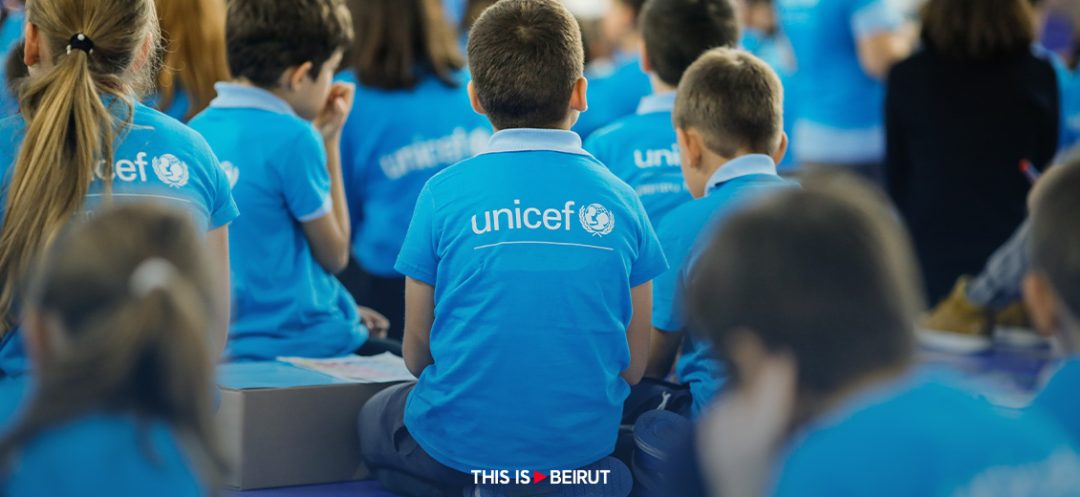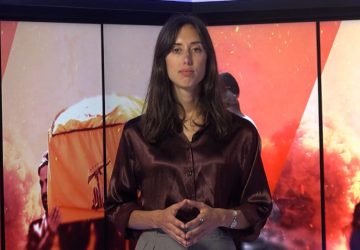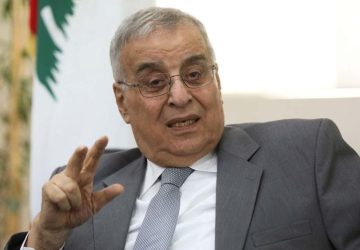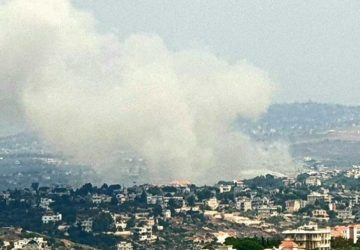Listen to the article
The United Nations Children’s Fund (UNICEF) is a United Nations agency dedicated to improving and promoting the status of children. Every six months, UNICEF looks at Lebanese socio-economic indicators and reports on the reality of the families that the agency monitors. This is Beirut met with Edouard Beigbeder, the representative of UNICEF in Lebanon, a few days before publishing the second bi-annual report for 2023 in both English and Arabic. This is Beirut looked at the state of childhood in Lebanon, education, health, the role of Unicef, and government relations.
What is the current state of childhood in Lebanon?
The reality for children in Lebanon is increasingly difficult in view of the crises that have succeeded one another since 2019: the financial crisis, the political crisis of institutions, the COVID pandemic, the explosion of the port, the growing number of refugees, and, at present, the war in the south with its ensuing displacements. Over the years, these factors have contributed to the collapse of institutions and to a reduction in the ability of families to provide the bare necessities for their children, especially families operating in a Lebanese pound economy. More and more children are no longer able to go to school, and more and more schoolchildren are leaving the classroom to work. Parents are being forced to choose which meals to serve their children and what they should put in them. Some can no longer afford health centers. All in all, in 2023, children have less chance of developing than they did in 2018. It’s a sad situation, all the more so because Lebanon’s capacities were quite considerable: the country had one of the best education systems in the region and a high level of health and medical care that we are no longer able to maintain today.
How has the situation evolved since your last report in mid-2023?
- In mid-2023, 7% of Lebanese children were no longer attending school. Six months later, 13% are deprived of education;
- 10% of Lebanese children have left school;
- 3% of Lebanese children work;
- A quarter of Lebanese children leave school before the end of pre-secondary education, where basic reading, writing, and math skills are taught at a higher level than literacy;
- At the public school, the average number of pupils in primary classes is 25. Eight or nine pupils will be enrolled in middle school.
Many of them leave school, sometimes even before the end of the school year, because they need to work and contribute to their own and/or their family’s needs. Others will go into private education after primary school; there is a growing lack of confidence in the public system. However, public schools have remained open despite the crises in Lebanon, and this fall, the new school year started on time. There is also an image problem with some public schools that needs to be addressed, especially as public schools have made a lot of progress in the last year and a half.
It is often said that public schools in Lebanon are increasingly serving young children of Syrian origin. What do you think of this conflation of Lebanese and Syrian children?
Syrian children are worse off than Lebanese children:
- More than one Syrian child in two does not go to school in Lebanon today;
- The number of Syrian children working in Lebanon is double that of Lebanese children.
All children, Syrian or otherwise, have a fundamental right to education. Our role is to try to find a way of ensuring this while we await a political solution that will return refugees to Syria. These children must return to Syria with the knowledge and skills that they learn and accumulate in Lebanon, where they are presently located.
With this in mind, we signed agreements with the Lebanese government in 2012, 2013, and 2014 so that Syrian children could be educated in Lebanese public schools in the afternoons.
In return, to compensate Lebanese public schools and ease the costs of afternoon schooling, we have set up programs to rehabilitate Lebanese public schools. To date, 117 schools have been rehabilitated, and another 110 will soon be completed.
These funds for schools offer a contribution for Lebanese children and a larger contribution for Syrian children. While the Lebanese government no longer has the same substantial budget that it allocated to Lebanese public schools before the crisis, we are trying this year to balance our contribution so we can better serve Lebanese and Syrian schoolchildren.
What about the other issues highlighted in this report?
School is fundamental; it is a place of protection. For children of elementary school age and outside the school system, UNICEF seeks to get them back into non-formal education and give them a minimum of baggage so that they can reintegrate. As for children of middle school age, we help them to develop their knowledge of writing, reading, and mathematics so that they can move towards learning skills that will benefit them in their working lives. These are the three very important types of programs.
Health-wise, the financial crisis led to a sharp decrease in the number of vaccinations in Lebanon, especially as people were frequenting the private sector and buying the vaccine from their doctors. In an effort to offset this drop in vaccinations, we worked with the Ministry of Public Health to set up free vaccinations in community health centers.
UNICEF is also working on water and sanitation. With the Ministry of Energy and Water, we have developed programs to repair the various water service structures in Lebanon by contracting teams from the private sector to repair a broken generator or a malfunctioning pump so that water can be supplied again.
UNICEF recently took over the wastewater treatment plant project on the coast. UNICEF, which does not typically carry out these projects, provides the wastewater treatment department with coordination support to help it fully integrate the system once the appropriate financial solution has been put in place.
Why does UNICEF work differently in Lebanon today than it does in other countries?
At the time of the crisis, part of the bilateral aid could no longer be channeled through the state because of the different exchange rates. For example, a 100-dollar note handed over to the Central Bank saw its value drop to one dollar fifty, which reduced the volume and impact of the programs for which these funds were earmarked. In order to maintain their commitment to Lebanon, bilateral donors had to maintain the value of the funds released. As a result, they could no longer go through the government, turning instead to non-governmental and international organizations such as UNICEF. Since then, this has made it possible to support the government by handling some projects, which will be handed over to the government once the country’s banking and financial situation has been restored.
Education, health, water… What about detention centers for minors and health centers for the very young?
Despite the progress made on this issue, much remains to be done, especially as the number of children placed in detention centers – that are unsuitable for their age – continues to rise. They await their court hearing, the time it takes for the few social workers contracted by the State to have finished covering the Lebanese territory. They will then await the court ruling, while a number of judges are on strike because of the crisis.
UNICEF is also working with the government to reform Law 422, particularly with regard to the age of criminal responsibility. Enacted on June 6, 2002, this law defines the legal framework for the protection of minors in danger and at risk. The law applies to all minors who are vagrants, beggars, victims of sexual assault or physical violence, or whose health, well-being, morals, or education are at risk, whatever their age. Law 422 sets the penal age (age of criminal responsibility) at 7 years, and UNICEF is joining efforts to advocate for the penal age to be raised to 14 years (as recommended by UNICEF) or to 13 years (as recommended by the Arab League). UNICEF is working with the various ministries concerned, including the Ministry of Justice and the Ministry of Social Affairs. The bill is currently before parliament, awaiting discussions, and will then be put to the vote.
The government and other agencies are working to set up a suitable detention center for children, given that the only detention center for minors is located in Zahle.
The health infrastructure was completely disorganized and is now in a critical state. UNICEF has worked hard with the Ministry of Public Health to bring hospitals back up to standard and to ensure that the ambulance and care services at the provincial level are efficient. Rebuilding the health system is crucial. It remains dependent on the macroeconomic reform of the state as well as on reforms at the state and ministry levels.
How do you work with the government? Have you identified individuals with whom you can work, take decisions, and implement them?
We work with the government and with the relevant ministries in perfect coordination, from the start of the project right through to its completion. For example, we’re working with the Ministry of Education to decide which of the country’s 1,232 public schools will receive the allocated funds and how the principals of these schools will receive the money for the maintenance of the schools. We are taking on certain responsibilities on a provisional basis, and we are not seeking to expand the UNICEF programs, as we aspire to a clear handover of responsibilities once the crisis has been resolved.
Ministerial civil servants receive one tenth or one twentieth of their salary and look for additional sources of income to support themselves. Motivation is therefore limited, and many of them are not at their desks, which means that we work with tightly-knit ministries.
Our collaboration with government agencies is quite clear. Together, we discuss needs in relation to the Children’s Program and then set up multi-year plans that donors finance. The contract is signed at the beginning of the year, and we try to follow it as closely as possible while conducting periodic reviews and maintaining very regular discussions with the ministries.
This has led to positive results, despite some very difficult times. Together with the Ministry of Social Affairs, we recently launched an allowance for disabled people aged between 18 and 28. This is the “handicap card,” the benefits of which are channeled through OMT directly to the beneficiary without passing through the state or the central bank due to the current financial situation. However, as soon as this situation is restored, bilateral and multilateral aid funds will no longer pass through UNICEF but through the government.
Your words will resonate with those concerned about the apparent expansion of associative and UN prerogatives in Lebanon, encroaching on the principles of national sovereignty and self-determination. In other words, you don’t want your institution to be a ministry instead of a ministry.
And we shouldn’t be, because this is not our role, and everyone should stick to their role. UNICEF today in Lebanon has a role that is not its role in any other country, a role that was not its role in Lebanon before 2019, and a role that should return to normal as soon as the financial mechanisms are revisited in Lebanon, which will bring the necessary order for trust to be restored.
Coordination with the government is very important. The same applies to civil society, which in some areas is responsible for the final stages of projects. The partnership between government and civil society is important, and organizations such as UNICEF facilitate the link between the two parties and promote dialogue between them. Coordination between all project players is necessary to consolidate the efforts made; hence, it is important for us to include the work we do with civil society.
Rebound after rebound, UNICEF’s action plan and strategy adapt to the reality in which we live. How do you design your action plan? At what point do you realize that a new problem should be considered, that an action plan should be drawn up, that funds should be released/requested, and that the necessary teams should be brought in? It’s a pretty heavy architecture.
It’s actually quite complex, all the more so as when bilateral aid was diverted from the government to organizations, a volume of conditions were put in place. This implies a greater burden of coordination with the government, strict conditions, and deadlines that sometimes overlap or even clash, hence the need for flexibility around programs to ensure good continuity, rather than starting a program and then stopping it, then restarting it and stopping it again a few weeks or months later.
It is also important that the state budget regains its importance. Typically, the budget should stipulate a certain number of activities to better coordinate actions between external aid and the gradual resumption of the state budget. Every month and every year of delay complicates the handover between associative and UN structures, on the one hand, and the government, on the other.
What do you think is required to ensure that the most basic, fundamental rights are honored and stop regressing?
First of all, we need peace. We also need a better definition of macroeconomics, because as long as one part of the population is dollarized at a time when exchange rates are at several levels, then one part of the population will remain downgraded in relation to another. Allowing one part of the country to reduce its capacity to invest in its own children inevitably leads to a very sharp social divide, which will no longer be tenable.
Even an organization like UNICEF is calling for major macroeconomic reforms. Confidence is also crucial if citizens are to pay the taxes needed to get the economy moving again. This confidence depends on certain reforms expected of the state to ensure better financial management (which in our case will, for example, create a coherent balance between the number of educators and pupils in public schools). A social contract is needed to reduce disparities within Lebanon.
Despite everything, the private sector is showing signs of recovery. There are some positive aspects to the country as a whole.
What can the individual do today to move in this direction?
Every parent wants the best for their children. Every parent in Lebanon wants to send their children to school. Parents who no longer send their children to school are in despair. They have no other choice, and they know very well that they are reducing not only the present but also the future of the child.
I was concerned when, a few months ago, the children knew the daily exchange rate. This shouldn’t be something that a child of 6, 8, or 10 knows or has the reflex to ask, “How much is the dollar?”
A whole generation of children is living in precarious conditions today. Children no longer go to school; they leave the school system and sink into a spiral of poverty. A poverty that leads to early marriage, dropping out of school, hard labor, and fewer chances in life.
It’s possible to break this spiral by investing heavily in education and health. Perhaps the new state budgets should focus on this, prioritizing certain reforms in health and education to enable better investment for tomorrow.
A strategy, a political will to divide and conquer, today and well into the future — according to the (in)actions regarding our children and future generations. But the will is there — the will to be present and to do what’s necessary to get the country back on its feet with people and institutions of good faith.
And Edouard Beigbeder adds: It’s possible, I think, that in 2 years in Lebanon, we could very well put childhood back at the center.





